- San Diego Symphony Orchestra
- Grace Mary Williams
- Orlando Gibbons
- Rudolf Brucci
- Marilyn Horne
- Choir of Durham Cathedral
- Salvatore Accardo
- Shostakovich: Symphony No 5
 VIDEO PODCAST: John Dante Prevedini leads a discussion about Classical Music and Artificial Intelligence, including contributions from George Coulouris, Michael Stephen Brown, April Fredrick, Adrian Rumson and David Rain.
VIDEO PODCAST: John Dante Prevedini leads a discussion about Classical Music and Artificial Intelligence, including contributions from George Coulouris, Michael Stephen Brown, April Fredrick, Adrian Rumson and David Rain.
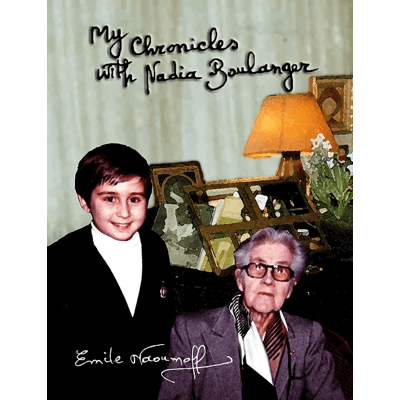 PODCAST: Join Jenna Orkin, Maria Nockin, John Daleiden, Gerald Fenech, Julian Jacobson, Patrick Maxwell, Giuseppe Pennisi and Mike Wheeler for a fascinating fifty-minute audio only programme.
PODCAST: Join Jenna Orkin, Maria Nockin, John Daleiden, Gerald Fenech, Julian Jacobson, Patrick Maxwell, Giuseppe Pennisi and Mike Wheeler for a fascinating fifty-minute audio only programme.
A Triumph
RODERIC DUNNETT listens to two one-act operas
There were two major successes here. This is the first time Leamington Music – surely one of the most amazingly rich, imaginative and palpably successful music series in the UK – has staged opera. What a welcome new development. Here as part of the first Warwick Choral Festival it had paired with students of the (since 2017) Royal Birmingham Conservatoire, lithe and alive in its Summer Opera season, in not one opera but two One-Acters merged in an intriguing and novel double bill. And the outcome? A triumph.

This sees the launch of a promising fresh close collaboration between Leamington Music and the Royal Conservatoire, a cause for some excitement on both sides. Opera at the Conservatoire (quite recently merged with the Birmingham School of Acting) has gradually emerged over the past, say, twenty years. Originally one tended to find mainly end-of-term 'opera scenes', showcasing as much talent as they could. Now here we are with full opera productions, and if the standard of what we saw at Warwick's homely Dream Factory, base of the company Playbox Theatre, is anything to go by, Birmingham is right up there with (say) the Royal Academy or the Royal Northern College. This – both halves – had fantastic freshness, and the earnestness of Marc-Antoine Charpentier's Les arts florissants and the (completely opposite) high spirits and frivolity of Jacques Offenbach's Mesdames de la Halle revealed such a uniform superlative quality of unbelievably mature, well-trained voices. It yielded a feast: the musicians at every turn; the stagings of staggering ingenuity and dexterity. It was a great evening.
It was not that easily viable to identify each character in this ode to Louis XIV in Les arts florissants, but arguably that needn't matter, they were all so good and meticulously well prepared. We know who each of the four were: music, poetry, architecture and painting. The last was easily recognisable, as it was the markedly accomplished and utterly delightful 'tenor' Daniel Marles, a Student Scholar (as were two others) with Birmingham's almost legendary Ex Cathedra choir (and there listed as a tenor, but here sounding much more like a haut-contre or countertenor - as Charpentier specified, and a role he, like Purcell, often took himself). The choir's Founder and Director, Jeffrey Skidmore, played a significant part in preparing the voices for this quite demanding early Baroque repertoire. The results were there for all to see. One assumes it was Music (Charlotte Day) who opened the evening so memorably: a fabulously pure and chaste voice, utterly flawless in intonation and delivery (as they all were).
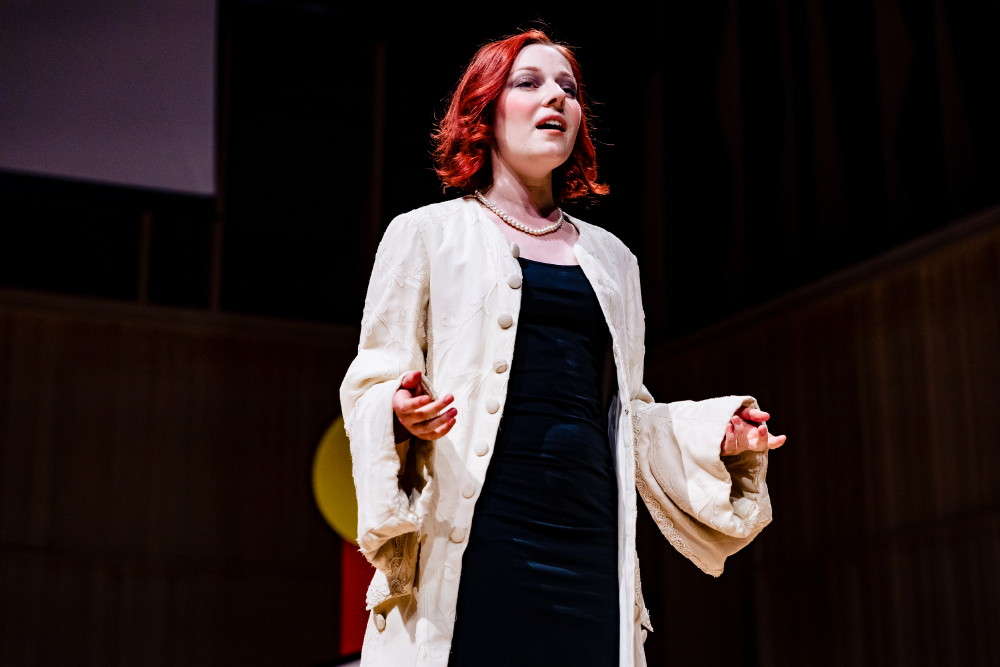
Charlotte Day as La Musique was one of the most ravishing voices of the evening, launching Marc-Antoine Charpentier's Les arts florissants. Photo © 2022 Vitaliy Turovskyy
And when Genevieve Hawes (Poetry) followed, the result shone out much the same.
The opera, or entertainment, was performed (1n 1685, stretching into 1686) in the Hôl;tel de Guise in Paris, a location where Charpentier (1643-1704) lived and worked for many years, and not at Versailles; and from 1670 became master of Music to the Duchess of Guise. Its relevance to Louis XIV is manifest throughout: as patron of the arts, as a benign ruler, and above all, as the bringer of peace to France. In fact, during his reign, France was embroiled in no fewer than three wars: against the Dutch; a nine years war against a large European coalition including England (which began just three years after this opera hailing him as the bringer of peace); and later, the even longer War of the Spanish Succession.
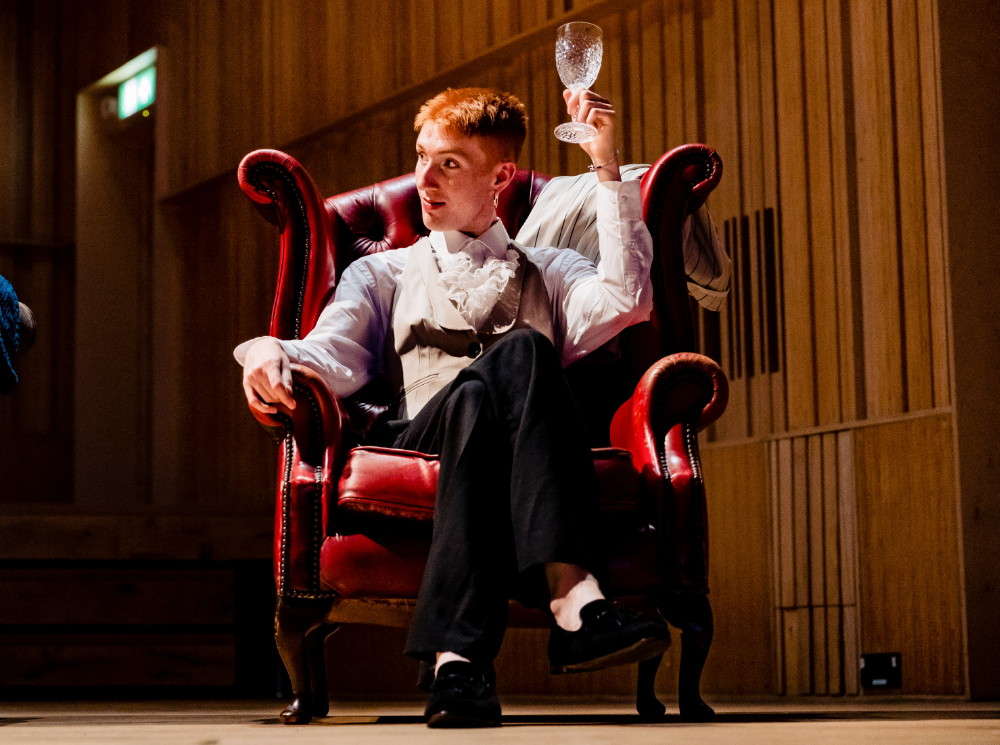
The malicious Discord (Oliver Barker) is determined to foul up the works, and shatter the others' slightly fawning admiration of Louis XIV. Photo © 2022 Vitaliy Turovskyy
However Louis also founded at least four Royal Academies: the Académie Royale de Peinture et de Sculpture (actually founded under his mother's supervision when he was still aged nine); the Académie Royale de Danse; the French Académie de Science; and most important for us, the Académie Royale de Musique. Most had been founded some twenty years or more before this opera's composition and premiere. But it is these achievements in the Arts that are being celebrated by these beautifully accomplished performers.
The gifts of these vibrant young Birmingham students, as both singers and actors, are quite remarkable. In fact, no praise could be too high. The central point of the story is a conflict between Peace (La Paix, Julia Morgan) – in fact all of them – and the shifty, outrageous, fancy, sneakily or even patently conniving character Discord (tenor Oliver Barker).
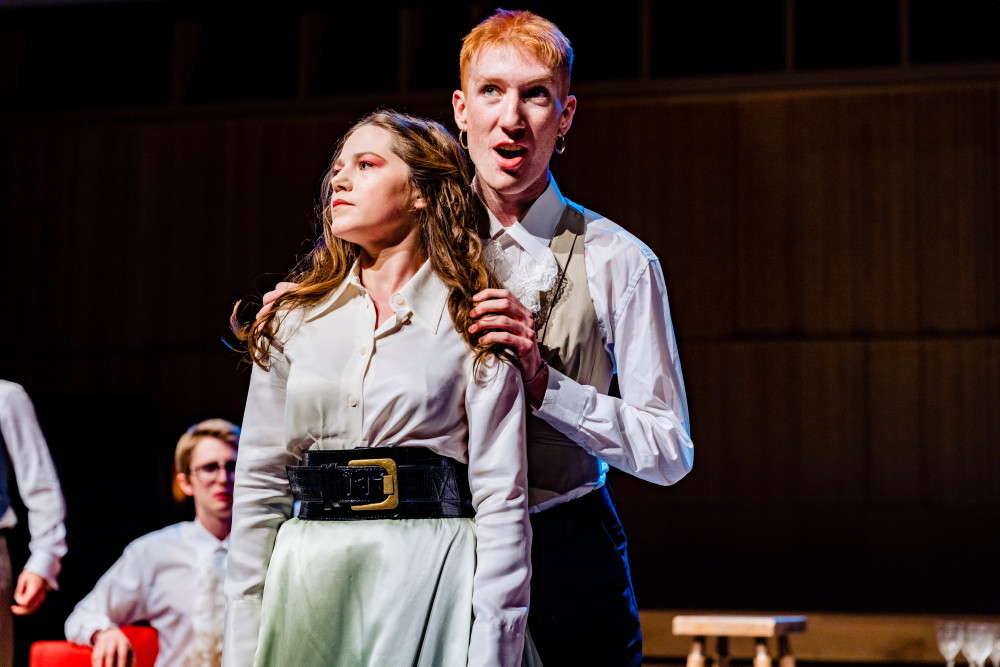
Discord (Oliver Barker) exudes evil as he not so surrepticiously endeavours to make mayhem of the good intentions of Peace (Julia Morgan) in Charpentier's Les arts florissants. Photo © 2022 Vitaliy Turovskyy
This dispute finally resolves itself with the banishment of sinister Discord (and supposedly his attendant Furies) and the triumph of the good. With the possible exception of a slow, slightly tedious Overture, the music under massively experienced conductor Fraser Goulding, previous Musical Director of Gilbert and Sullivan at the D'Oyly Carte, and of sundry other opera companies, livened things up marvellously.
Thus all the singers were offered, by a small but accomplished band, an ideally paced vehicle to show off their talents. The pouting and finally worsted Discord almost won our admiration; Daniel Marles' Painting (Peinture) was a joy to hear every time he opened his mouth.
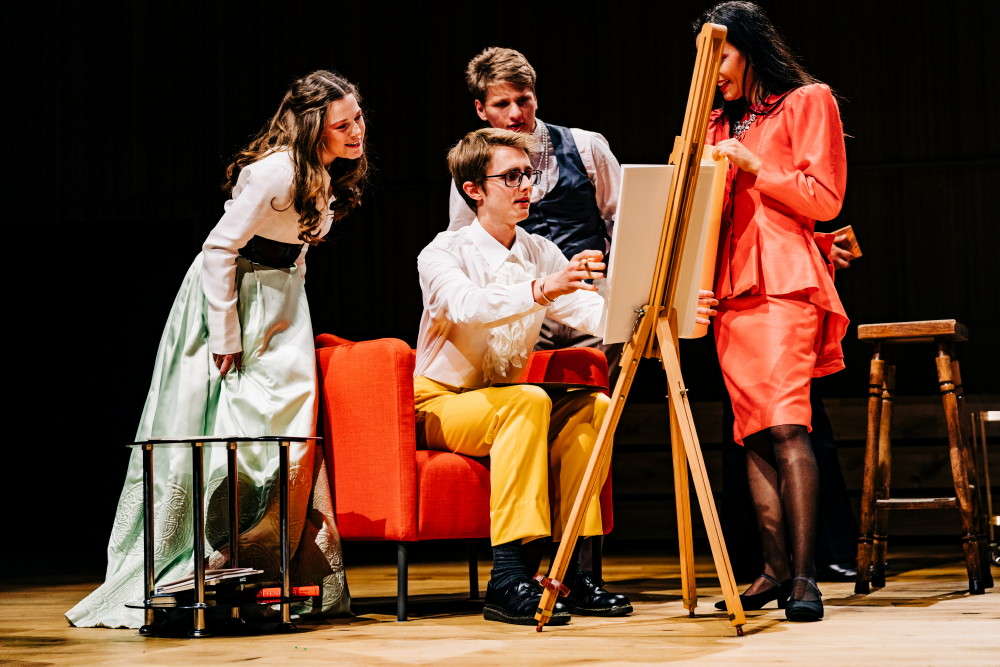
Tenor Daniel Marles (Painting) in high tessitura was another of the evening's delights, enticing his Muse-like fellow-admirers with his art (and vocal) skills in Les arts florissants. Photo © 2022 Vitaliy Turovskyy
Katie Hackman (Architecture) effortlessly equalled the sophisticated singing of the other two girls, Music and Poetry (and, of course, Peace).
The other outstanding feature of the acting was the management of the chorus. The director, Stuart Barker, whose expertise has reached out (especially) to most of the British Conservatoires, is currently with BYO (British Youth Opera). His direction of both operas here was above all responsible for the sheer flood of dexterity, adroitness and overall visual ingenuity, indeed ceaseless and unflagging, impact of the evening. How to stage Les arts florissants – essentially an allegorical piece, common since Monteverdi, without any obvious way of manipulating the characters - would be a challenge for any director. That Barker managed to contrive so many moves that accorded ideally with the text left one deeply satisfied.
This included the half dozen members of the chorus. It is here that Charpentier, some feel, deploys a wealth of the best music of this opera. But the range of moves the director devised, focused upon but not overusing two settees or sofas, and indeed a painting easel, was miraculous. There was constant activity; and every one of the characters was finely trained to enact, and possibly understand, the moves and their purpose. This professionalism and wizardry gave each of the five scenes - of this opera, or idylle en musique, as the composer dubbed it - life, vigour and energy in its optimism; or conversely, where the text grows more serious, gravity and sobriety. The praise of the king which terminates, or intervenes in, most of the characters' contributions, recalls the same element in Charpentier's shorter-lived near-contemporary - actually sixteen years younger - Henry Purcell, whose royal Welcome or similar Odes (including for Queen Mary and for, tantalisingly, her father James II of England) strike a comparable note.
This splendidly elegant, inspiring Charpentier production was succeeded in the second half by an outwardly short but in fact quite substantial opera by the highly productive comic opera deviser Jacques Offenbach (1819-1880), who penned an incredible ninety or more such operas in his sixty or so years, many of them in one Act like this one.
Mesdames de la Halle - actually staged by Glyndebourne in 2020 - premiered at the Théâtre des Bouffes Parisiens, the same year as (his best known) Orpheus in the Underworld at the same venue and, after an incredible tally of six one-acters the preceding year (1857), was the first of three new works (in this case, opérette bouffe) he saw premiered in 1858. This was his favoured venue (although ten early works were previously held at the recently completed Salle Lacaze); five brand new operettas by Offenbach had been staged in 1855, and seven in 1856. His productivity was astonishing, easily outshining even Donizetti's roughly sixty-four, let alone Rossini's thirty-eight.
This natty, hugely entertaining operetta puts a largish cast (of here, eleven leads plus chorus) onstage. And in this (Royal) Birmingham Conservatoire production, what a hoot they were. The Marché des Innocents, where the action purportedly takes place, supplies us with a clutch of characters – pushy, randy, desirous, crazy, quarrelling – who are anything but innocent.
Much of the humour throughout this second show involves Madame Madou (Alex Pratley) and Madame Beurrefondu (Oliver Barker, who had already done a turn as Discord in the Charpentier), as competing vegetable sellers - Les Halles was in fact the historic market, dating back to the twelfth century - plus a third vendeuse, the fish-seller (Archie Playdon), who will emerge as a key character near the end, but who prefers to keep on the edge of things as the other two battle it out.
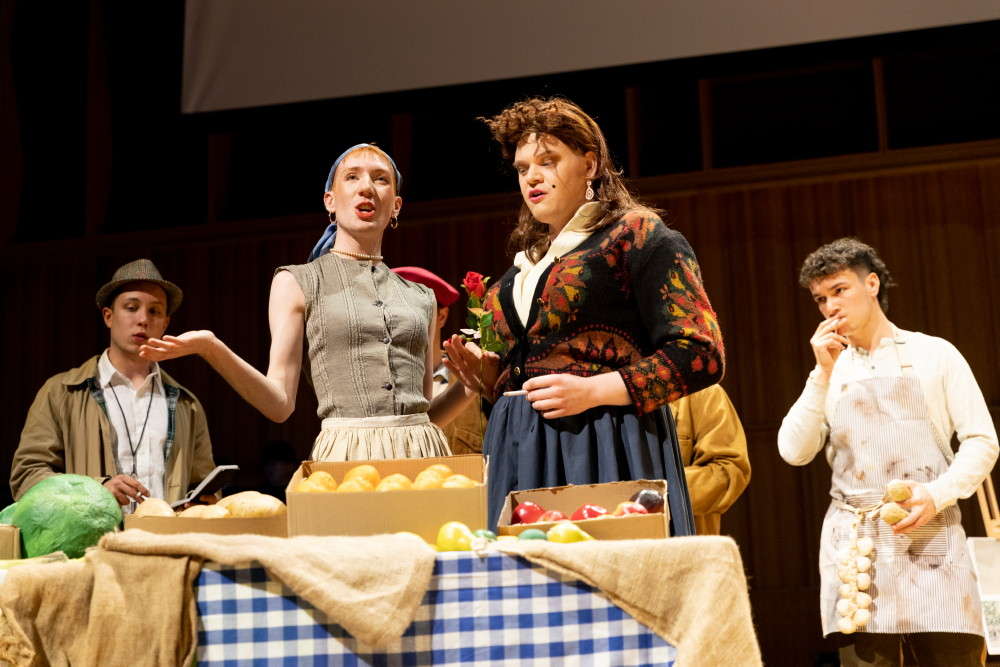
Pushy vegetable seller Oliver Barker (Mme Beurrefondu) prattles away, to the diversion or annoyance of his neighbour Mme Madou (here, Charlie Murray, on right) in Offenbach's Mesdames de la Halle. Photo © 2022 Vitaliy Turovskyy
If the hilarity never stops for a minute – what a joy to see this team under Barker's direction living up to Offenbach with such outrageous vitality and unceasing zest – a lot is owed to the costume designer, Lucy Crowe. The flood of colour in these saucy women's (and others') attire seemed to capture all the spectrum of the rainbow, and many more almost subtler variations. Little details, like Beurrefondu's fiddly headscarf, actually figured quite large. These characters were not just bellicose and truculent; they were louche, sexy and voluptuous. When they each (singly or together) raunchily flirt, utterly unsuccessfully, with the nonchalant 'boy' Croûte-au-pot - what age? 'Crust in a Pot' presumably because he is a kitchen boy - who has other plans, the laughter they generated was colossal.
Part of the fun of the argy-bargy is the way these two flouncy women – sometimes the three – argue and row and brawl and all but come to blows and engage in unremitting punch-ups, and then as instantly make up and are all over each other with matiness and goodwill. Oliver Barker and Alex Pratley carry on like seasoned comic practitioners. Their rapid swings are so witty and crazy that they elicit a laugh with every one. They tickle and tease us and smother us in comic brouhaha. Barker, having produced a camp Discord, captures with his flamboyant feminine, or mock-feminine, gestures and poses, and virtually carried the show single-handed.
There were other moderate successes: a bumptious soldier (drum major, Raflafla, a former corporal, seeking to eradicate his debts) from a very acceptable tenor (Frankie Bounds); an interfering official (Commissaire, Henry Saywell, who has already doubled as a soldier in Les arts florissants), who wheels the prattling, fisticuffs women off (bizarrely briefly) to jail; various other onstage vendeuses; and a small chorus who bring extra life to the principals in a number of more vigorous exchanges.
But one has to lard praise on Charlotte Browne's believable, much lusted after, but in no way acquiescent or interested, Croûte-au-pot – Offenbach and one of his umpteen librettists - here Armand Lapointe, 1822-1910, who wrote almost forty libretti, although only this one for Offenbach - always attach bizarre names to their characters.
Fraser Goulding's (this time round larger) orchestra turned out some tip-top touches: clarinet (shrieking merrily at the end), light brass (eg solo horn and trumpet together), flutes like fifes at the close, woodwind calls for the soldier: Offenbach's score has the endless freshness and originality, even innovation, of a true master, and the quality of the playing of all here was a treat. This operetta has to have bounce, brio, zest, energy, endless animation. It received all this in droves – scoring an all-out success in the finale. But Royal Birmingham Conservatoire's solo instrumentalists and rewarding orchestral players are the professionals of the future. As was proved, no praise can be too much. They're marvellously professional already.
The culmination of the operetta consists of two very different elements. First comes the entrancing arrival of - yet another supposed vegetable seller, but scarcely here - the enchanting young (supposed) orphan Ciboulette. The two teenagers have a delightful love duet, both sopranos with exquisitely trained voices, their interchange winding touchingly round each other. Offenbach engages his most charming, expressive composing – a lovesick girl and her equally pining inamorato - a trousers role, a teasing element familiar from many of Offenbach's, but also a host of other French nineteenth century composers' operas. Ciboulette (Matilda Wale) is given touches of coloratura, which she masters entirely. She provided a lovely, entrancing, naïve, tender-hearted persona.
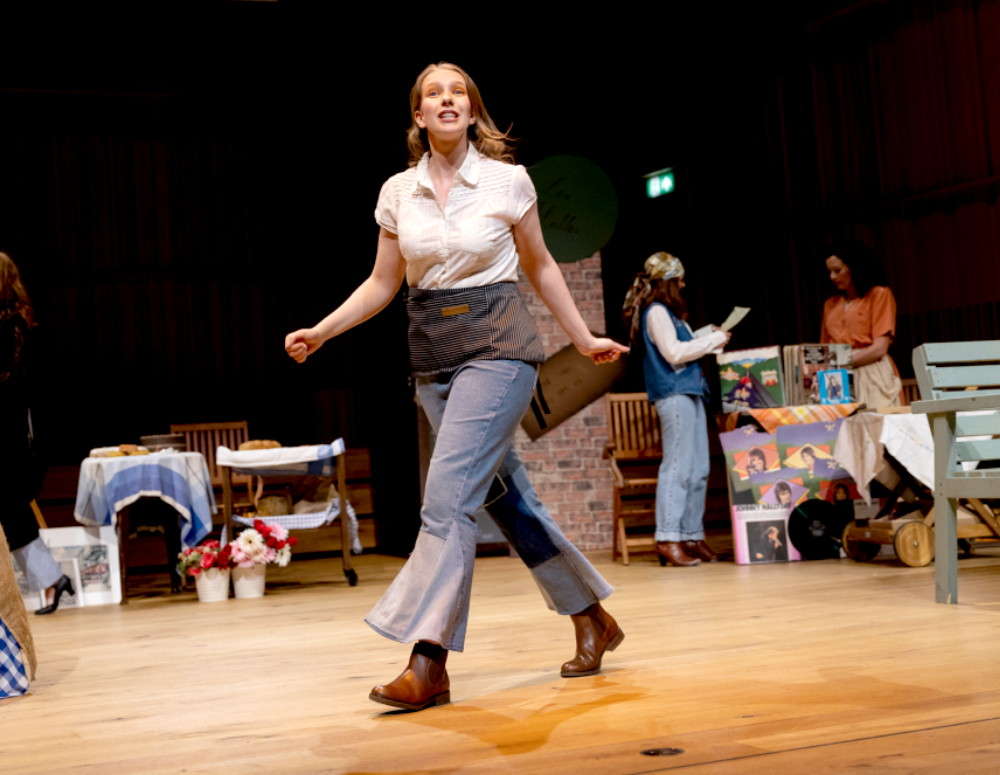
Ciboulette (Matilda Wale), touchingly in search of her long-lost parents to get permission to marry her love-lorn kitchen boy, Croûte-au-pot (the no less enchanting Charlotte Browne) in Offenbach's Mesdames de la Halle. Photo © 2022 Vitaliy Turovskyy
And then the utterly dotty final moments: each of the women, principally the aforementioned twosome, discovering Ciboulette cannot marry because she does not know her parents to get permission, fantastically pose as that missing mother. But no, in the end, a classic Offenbach conclusion: it turns out, against all likelihood, that her mother is Archie Playdon's very ample, warm-lipped fishwife Mme Poiretapée (who has a comely, nicely delivered aria of her own), and her father the (here absurdly young) Drum Major; so now she has the OK from both parents.
Just as unlikely in this joyous conclusion is that the other two losing claimants join wholeheartedly in the almost hymnic celebrations. Creatures of magnificent startling paradox, the fickle pair keep up their mercurial antics to the very end. Barker doesn't let up for a moment. Thanks to him in particular, Offenbach won. No wonder this show was a miracle.
Such excellence deserves backing. And support. And subsidy. Great news: the Conservatoire has just learned that it is to receive very substantial sponsorship specifically for its opera activities over the next three years from the Linbury Trust, which funded the start and continuation of the Linbury Studio Theatre at the Royal Opera House: a huge uplift for this thoroughly worthy company. Opera at the RBC goes from strength to strength. All power to its elbow.
Copyright © 7 July 2022
Roderic Dunnett,
Coventry UK



